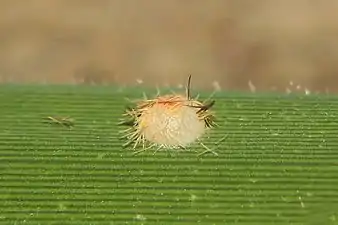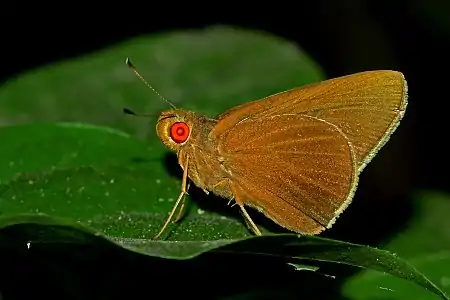Matapa aria
Matapa aria, the common redeye,[2] is a butterfly belonging to the family Hesperiidae found in India and Southeast Asia.[2][3][4]
| Common redeye | |
|---|---|
.jpg.webp) | |
| Scientific classification | |
| Kingdom: | |
| Phylum: | |
| Class: | |
| Order: | |
| Family: | |
| Genus: | |
| Species: | M. aria |
| Binomial name | |
| Matapa aria | |
| Synonyms | |
| |
Description
Male and female chocolate brown.
Male. Upperside, pale brown; forewing with a short impressed comma-like grey streak obliquely beneath the cell. Cilia yellowish white. Underside bright ferruginous brown. Palpi ferruginous brown.
Female. Upperside dark chocolate brown without the impressed streak; cilia of hindwing pale orange yellow. Underside bright ferruginous brown.[5]
The larvae feed on Bambusa striata, Ochlandra travancorica and Ochlandra scriptoria.[6]
- Life cycle
 Egg
Egg.jpg.webp) Larva
Larva.jpg.webp) Pupa
Pupa Imago
Imago
References
| Wikimedia Commons has media related to Matapa aria. |
| Wikispecies has information related to Matapa aria. |
- Matapa at Markku Savela's Lepidoptera and Some Other Life Forms
- R.K., Varshney; Smetacek, Peter (2015). A Synoptic Catalogue of the Butterflies of India. New Delhi: Butterfly Research Centre, Bhimtal & Indinov Publishing, New Delhi. p. 54. doi:10.13140/RG.2.1.3966.2164. ISBN 978-81-929826-4-9.
- W. H., Evans (1949). A Catalogue of the Hesperiidae from Europe, Asia, and Australia in the British Museum. London: British Museum (Natural History). Department of Entomology. pp. 171–172.
-
 One or more of the preceding sentences incorporates text from a work now in the public domain: Swinhoe, Charles (1912–1913). Lepidoptera Indica. Vol. X. London: Lovell Reeve and Co. p. 330.
One or more of the preceding sentences incorporates text from a work now in the public domain: Swinhoe, Charles (1912–1913). Lepidoptera Indica. Vol. X. London: Lovell Reeve and Co. p. 330.
-
 One or more of the preceding sentences incorporates text from a work now in the public domain: E. Y., Watson (1891). Hesperiidae Indicae : being a reprint of descriptions of the Hesperiidae of India, Burma, and Ceylon. Madras: Vest and Company. p. 24.
One or more of the preceding sentences incorporates text from a work now in the public domain: E. Y., Watson (1891). Hesperiidae Indicae : being a reprint of descriptions of the Hesperiidae of India, Burma, and Ceylon. Madras: Vest and Company. p. 24.
- Kalesh, S & S K Prakash (2007). "Additions of the larval host plants of butterflies of the Western Ghats, Kerala, Southern India (Rhopalocera, Lepidoptera): Part 1". Journal of the Bombay Natural History Society. 104 (2): 235–238.
This article is issued from Wikipedia. The text is licensed under Creative Commons - Attribution - Sharealike. Additional terms may apply for the media files.